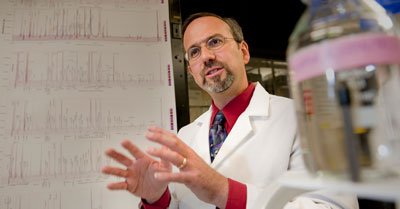Metabolomics: From Molecules to Cells to Humans

Bruce Kristal, PhD |
In the 2012 American Association for Cancer Research (AACR) Cancer Progress Report, Bruce Kristal, PhD, Department of Neurosurgery explains how studying many minute molecules can aid in the fight against cancer. The following is Kristal's article. The full AACR Cancer Progress Report is published in the October issue of Clinical Cancer Research.
Metabolomics is the simultaneous study of hundreds to thousands of small molecules in a biological system of interest, such as the blood, urine or a tissue sample. Metabolomics provides an integrated view of how messages from the genome, epigenome and environment influence the biochemistry of a particular system at one point in time.
As such, we can simultaneously measure entire biochemical pathways, such as all of the molecules that comprise the system for energy generation in a cell (and the flux through that pathway); interactive pathways, such as the pathways involved in cell growth; and conceptually linked systems, such as antioxidants and oxidative damage products. Therefore, metabolomics complements other large-scale approaches, such as genomics, epigenomics, transcriptomics and proteomics, for analyzing a cell and an individual's status at any moment in time.
Because tumor cell physiology can be different from the physiology of normal cells, it is widely anticipated that metabolomics can be used to improve our understanding of the causes of cancer, improve early diagnosis and facilitate cancer drug development.
For example, investigators are examining the utility of metabolomics in identifying indicators, or biomarkers, of increased cancer risk and in establishing biomarkers that can help predict a
patient's disease course or treatment response. In addition, metabolomics can be used to determine new potential drug targets and to help understand how a drug works or causes its side effects. This area of research is a rapidly growing field that shows tremendous promise for improving our understanding of cancer as well as its prevention, detection, diagnosis and treatment while simultaneously lowering the costs of both patient care and drug development.
About the 2012 AACR Cancer Progress Report
The 2012 AACR Cancer Progress Report celebrates cancer research advancements, particularly in the past year alone. With the help of the National Institutes of Health and the National Cancer Institute, a foundation for progress has been laid out that has aided in the development of several promising cancer treatments, which are discussed in the report.
The report presents a myriad of basic science breakthroughs that have revealed new insights into cancer treatment.